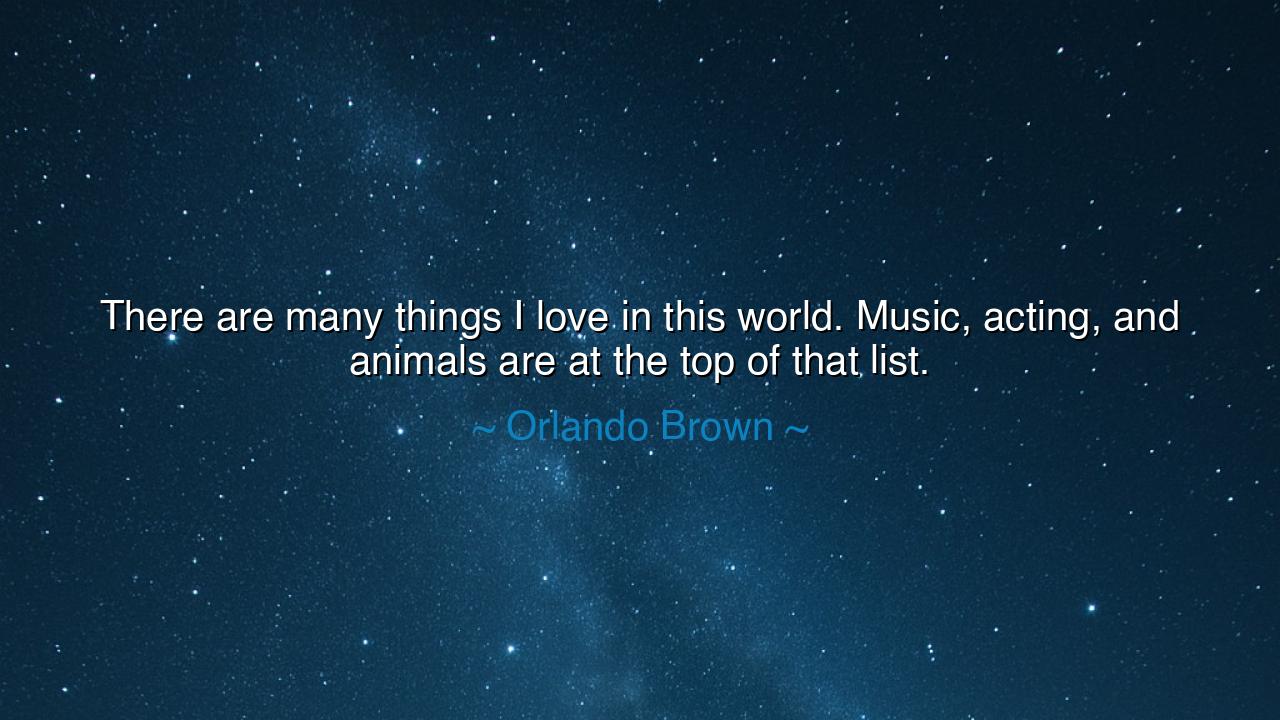
There are many things I love in this world. Music, acting, and
There are many things I love in this world. Music, acting, and animals are at the top of that list.






"There are many things I love in this world. Music, acting, and animals are at the top of that list." Thus spoke Orlando Brown, and though the words seem simple, they conceal a truth both profound and eternal: that life’s worth is not measured in possessions or power, but in the passions that nourish the soul. For what is existence if it is not filled with love? And what greater treasures can there be than those that bring harmony, expression, and compassion into the world?
The ancients taught that the heart must be anchored in the things that give it joy. To the Greeks, music was not mere sound, but a divine gift from Apollo, capable of healing both mind and spirit. To the Romans, acting and the theater were not just performance, but mirrors held up to human nature, where people could see themselves, their virtues, and their flaws. And to all peoples across the ages, animals were companions, symbols, and guardians, teaching humanity the lessons of loyalty, courage, and gentleness. By naming these three, Brown places himself in the long tradition of those who sought not wealth, but connection to the deeper rhythms of life.
Music, as he names it, is first among equals. For music is the heartbeat of the world—the song of birds at dawn, the rhythm of waves against the shore, the chants of laborers, the hymns of worshipers. It is the universal tongue, crossing boundaries of race and nation, lifting the weary, stirring the courageous, and comforting the broken. From the psalms of David to the protest songs of modern times, music has been humanity’s companion in joy and in sorrow. To love it is to love the language of the soul itself.
Acting, too, holds a sacred place. The ancients believed that through drama, the deepest truths of humanity could be revealed. The tragedies of Sophocles and the comedies of Aristophanes did more than entertain—they instructed, they warned, they inspired. In acting, a person becomes more than themselves, stepping into the lives of others, bearing witness to the struggles and triumphs of the human race. To love acting is to embrace empathy, to embody stories greater than one’s own, and to share them so others might see themselves reflected.
And then there are the animals, companions to mankind since the beginning. They walked beside us when we were wanderers, guarded us in the dark nights, plowed our fields, carried our burdens, and warmed our hearths. Yet more than their labor, they have offered us something deeper: loyalty unshaken, affection unspoken, and lessons untaught by human lips. To love animals is to recognize the kinship of all living things, to honor the wildness and innocence that still dwells in creation.
The meaning of Brown’s words is this: a full life is built not only upon ambition, but upon love—for the arts that feed the spirit, and for the creatures that remind us of our place in the circle of life. He speaks with the wisdom of one who knows that in a chaotic world, these anchors of music, acting, and animals provide stability, joy, and a reminder of what is pure.
The lesson is plain: guard your loves, and place them at the center of your existence. Do not neglect them for fleeting gain, for in the end it is these loves that will sustain you when all else fades. Let music heal you, let acting expand your heart, and let animals teach you compassion. Build your days around the things that make you feel most alive, for in them you will find both meaning and peace.
Therefore, children of tomorrow, take this teaching to heart: cherish what you love. Declare it openly, nurture it faithfully, and let it shape the life you live. For it is not the wealth of kingdoms, nor the applause of multitudes, but the simple, enduring loves—of art, of truth, of living beings—that will make your soul rich and your days radiant.






AAdministratorAdministrator
Welcome, honored guests. Please leave a comment, we will respond soon